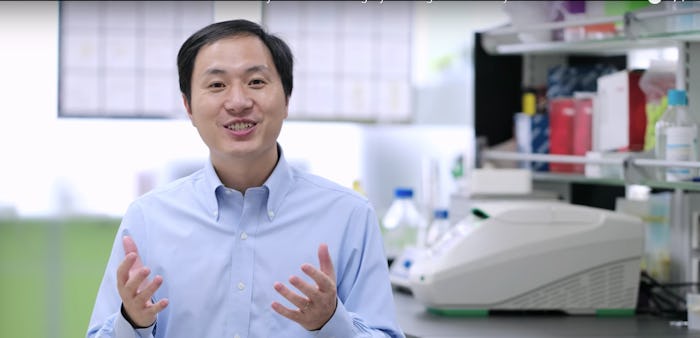News
Scientist Who Claims He Created World's First Gene-Edited Babies Sparks Backlash
As technological abilities continue to progress, people are faced with new ethical questions. Recently, a scientist in China has claimed that he created the world's first gene-edited babies, according to the Associated Press. These claims have sparked questions and backlash, including from other medical professionals, and shines light on one important question: when it comes to science, how far is too far?
Gene editing is a type of genetic engineering in which DNA can be inserted, deleted, modified, or replaced. Although Genetics Home Reference noted that it can be useful in understanding diseases, it's created a significant ethical dilemma for scientists. As such, a panel of experts from the United Nations Educational, Scientific, and Cultural Organizations (UNESCO) called for a ban of the practice on human DNA.
One concern is that the DNA changes can pass on to future generations and harm other genes, according to UNESCO. Gene editing also poses concerns regarding the renewal of eugenics, according to the International Bioethics Committee. Gene editing is banned within the United States, as reported by the AP.
But a Chinese researcher, He Jiankui of Shenzhen, claims that he altered embryos for seven couples during fertility treatments, according to the AP, with one resulting pregnancy so far.
He claimed to have edited the genes of twin girls Nana and Lulu using CRISPR-cas9, a gene editing tool, as Popular Science reported. He reportedly chose to disable a gene called CCR5, which forms a protein doorway allowing HIV, the virus that causes AIDS, to enter a cell, according to the AP.
The hospital has denied knowledge of He's research and has reportedly suspended him without pay, according to Popular Science, and it's unclear how true He's claims are. The researcher has uploaded a promotional video to YouTube, where the twins do not appear. Still, He's claims have created a ton of backlash.
In an interview with CBS This Morning, for instance, David Agus offered his own critique of the claims, saying, "It's not a perfect treatment, and the problem is there's a lot of off-target effects. This enzyme is promiscuous, even though it can change one letter it happens to maybe change other things in the DNA." People without a normal CCR5 gene face higher risks of getting certain viruses, such as West Nile, and dying from the flu, according to the AP.
Other medical professionals have chimed in to offer their own concerns. Many are noting that, although it's unlikely the claims are accurate, it still poses huge ethical concerns.
Romper's request for comment from He was not immediately returned.
"Gene edited babies: there are 47 reasons to doubt that this is real, and I remain extremely skeptical, regardless of the extraordinarily problematic nature of the work itself," one person tweeted, adding, "Whether it’s true or not, this is a shameless and crap way to go about doing what ought to be regarded as profoundly important science."
According to Science Magazine, The Chinese Academy of Science released a statement regarding the claims, saying, "we firmly oppose any research entity to perform gene editing on human germline for reproductive purposes especially when the ethics and legal constraints are clearly set out.”
Paula Cannon, who has worked on gene-editing trials regarding the same genes (but not on human embryos) told The Atlantic, "Was this a reasonable thing to do? I would say emphatically no." In the same interview with The Atlantic, Cannon further explained:
The idea that being born HIV-susceptible, which is what the vast majority of humans are, is somehow a disease state that requires the extraordinary intervention of gene-editing blows my mind. I feel like he’s appropriating this potentially valuable therapy as a shortcut to doing something in the sphere of gene-editing. He’s either very naïve or very cynical.
Hank Greely, an ethicist from Stanford University, also told The Atlantic, "If it is true, I’m disappointed. It’s reckless on safety grounds, and imprudent and stupid on social ground." Meanwhile, Qiu Renzong, a bioethicist and emeritus professor at the Chinese Academy of Social Science, also criticized the claims and He's decision to allegedly work "outside established and supervised scientific protocols."
He attended graduate school within the United States, according to Inside Higher Ed, and Rice University is now investigating claims that a Rice physics and bioengineering professor allegedly worked with He on the project. He's claims have not been published within a peer-reviewed journal, according to Inside Higher Ed, and there have been no independent confirmation of his claims, as the AP reported.
For now, Popular Science reported that He is under investigation.
